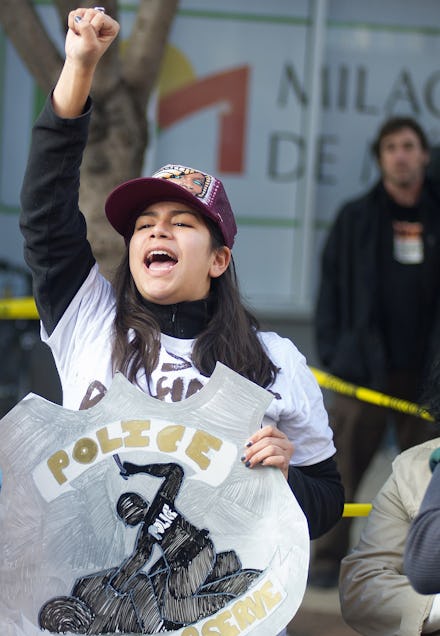You Can Absolutely Guess Which Group Is Most Likely to Approve of Police Beating People

There are many people who would be sad if you were to get beaten by the police. There are also many who would believe the police had a valid reason for the altercation — and there's a high likelihood that these people would be white.
The 2014 General Social Survey has revealed that 70% of white Americans "can imagine a situation in which they would approve of a police officer striking an adult male citizen," according to the Associated Press. That's compared to 42% of black Americans and 38% of Latinos.
Whites are also significantly more likely to support the death penalty for convicted murderers, and to support police beatings for suspects trying to escape custody. The clearest point at which blacks and Hispanics approved of police beatings more than whites was when murder was involved: Twenty-four percent of blacks approved of striking a murder suspect during questioning, compared to 18% of Hispanics and 12% of whites.
Overall, this should surprise no one. Comparatively, white people tend to have a more positive outlook on the practices of law enforcement officials, possibly because many whites "have never had an altercation with a police officer," or because they tend to "see the police as allies in the fight against crime," George Washington University sociology professor Ronald Weitzer told the AP.
Of course, the term "fight against crime" has had a strong racial element since its inception. The New Jim Crow author Michelle Alexander has written and spoken at length about how "tough on crime" rhetoric was used to justify heavy policing of poor black and brown communities as part of the war on drugs.
Which is to say, the police-citizen relationship is different for those Americans than for whites. Since last summer in particular, a string of police killings targeting unarmed black man has brought into the foreground vast disparities in how communities are policed. Black men face disproportionately high arrest and incarceration rates for similar crimes as whites, while racially targeted municipal fines and ticketing have plundered black communities and created profit streams for many American police departments — most notably in the recent case of Ferguson, Missouri.
As a result, trust in law enforcement can be understandably hard to come by in black and brown communities. But police beatings of black men have an especially fraught history in the U.S. The two biggest uprisings in the history of Los Angeles — the 1965 Watts Riots and the 1992 Los Angeles Riots — were precipitated by such incidents. Similar beatings fill the news today: In Inkster, Michigan, 57-year-old Floyd Dent is suing police after being placed in a chokehold and punched 16 times in the head by a group of police officers in January.
That incident was caught on video. Yet despite such documentary evidence showing how easily police power can be abused, there remains a gap in how Americans perceive beatings. Considering the typical targets of these attacks, it's unsurprising that this fissure runs along racial lines.